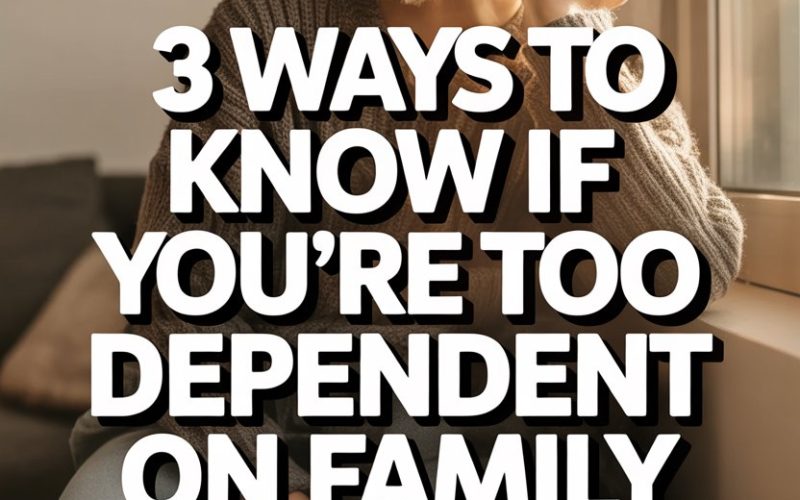Do you ever catch yourself wondering if your family group chat should be renamed “Emergency Helpline”?
For busy parents, it’s completely normal to lean on grandparents, siblings, and aunts who somehow always know where the lost school shoes are.
But when does a bit of help turn into a lifeline you can’t function without?
Let’s figure out if that safety net is holding you up—or holding you back.
1. Your Independence Has Gone on Permanent Holiday
Remember back when you could make a plan without consulting the family oracle? If every decision—big or small—needs group consensus, you might just be outsourcing your confidence along with your childcare.
Maybe it started innocently: you texted your mum about which cough syrup actually works, and now she’s weighing in on what your child should wear when it rains in July. Or perhaps you can’t decide what to cook for tea until your sister votes on the menu.
If you’re hesitating to make simple choices, even the Tesco delivery slot, without checking if Nan approves, it’s time to ask yourself whose life you’re actually living.
Clinical psychologist Dr. Rachel Andrew points out that relying too much on family for day-to-day decisions can chip away at your self-trust.
In her words, it’s like “having training wheels well into adulthood—eventually you forget how to pedal on your own” source.
Now, there’s no judgment here. We all know the school admin is designed to break even the sturdiest among us.
But if every hiccup triggers a phone call home, you may be turning to your family not just for help, but for approval and reassurance you could (and should) give yourself.
What to try tonight: When a minor parenting decision crops up, resist the urge to poll the family chat.
Make the call yourself, even if it’s just deciding whether the youngest can have ice cream before dinner (and bracing for the sugar rush consequences).
2. Boundaries? What Boundaries?
If the line between “supportive family” and “family residency program” is blurrier than your toddler’s attempts at colouring, you might be tangled up in dependence.
Maybe Grandma pops in “just to drop something off” and ends up reorganising your kitchen. Or your brother has his own key and uses your house as a shortcut to his.
If the family is present for every milestone—from the first nappy change to your child’s first wobbly bike ride—great!
But if they’re also present for every meltdown, lost shoe, and argument about screen time, it’s worth examining if you’re opening the door too wide.
Healthy parenthood involves creating your own household culture, which means drawing lines—even if those lines are just “please text before coming over” or “we’ll try it our way today, thanks.”
According to Stanford Research, over-involvement can stifle both confidence and creativity, making it tough for parents to find their own rhythm.
No need to go full fortress—family is a fabulous resource, and yes, sometimes you do need another adult to witness the masterpiece your child made from spaghetti and glue. Just ensure visits and advice are helpful, not overwhelming.
What to try tonight: Set one small boundary.
Maybe you switch your phone to silent after 8 p.m., or let your family know you’ll be trying bedtime routines without input. It might feel odd at first, but a bit of space can work wonders.
3. You Struggle to Cope Solo
Ever had that heart-thudding panic when your go-to family helper’s out of town, and you have to handle the toddler tantrum and the missing sports kit without backup?
If the thought of solo parenting for an afternoon sends you into a cold sweat, it’s worth considering if dependence has crept in.
Plenty of parents thrive with a “village.” Still, if you struggle to function unless your family’s on standby, it may signal it’s time to build your own reserves.
According to a recent survey by Netmums, nearly half of UK parents rely on grandparents for childcare at least once a week. That’s not a problem—unless it leaves you feeling helpless on the days they’re unavailable.
A bit of stress in these moments is normal, but chronic anxiety? That’s your sign.
Building solo confidence doesn’t mean going it alone forever. It means practising flying solo in small, manageable doses.
And yes, chaos may ensue—a bit like when you try to leave the house before your morning coffee—but each little win adds up.
What to try tonight: Pick one evening this week to handle the kids’ dinner and bedtime without calling for reinforcements. Embrace imperfect results (cereal and bananas for tea is still a meal). You might surprise yourself.
Finding Balance with Family
Family can be a lifeline, a laugh, or a logistical godsend—sometimes all three before breakfast. But when dependence turns into a default, parents can miss out on the trials and triumphs that make family life truly theirs.
Checking your own habits isn’t about guilt. It’s about making sure your support system lifts you up, not props you so much you forget how sturdy you are.
After all, every parent deserves a bit of autonomy with their side of mashed peas.
And if you ever find yourself second-guessing, well, trust yourself a little more. You’re doing better than you think—family or no family.




